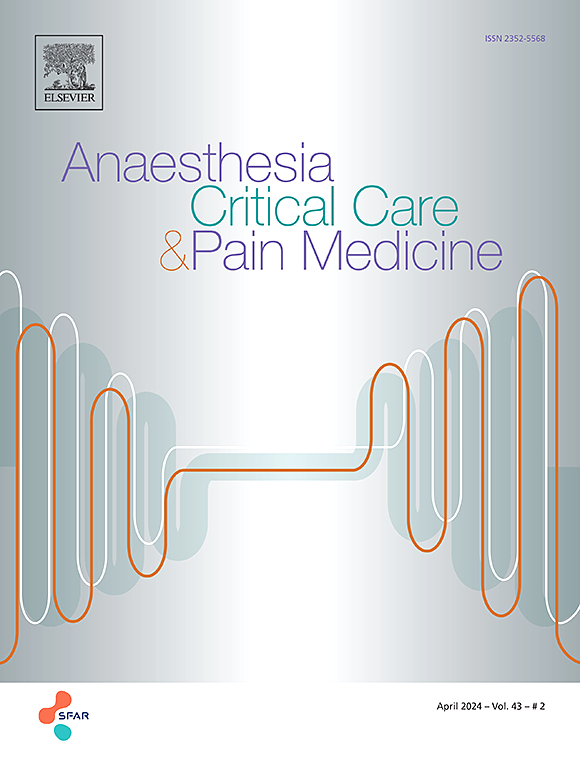Anticoagulant management in Emergency settings: 2024 guidelines from the French Society of Emergency Medicine (SFMU), the French Society of Anaesthesia and Intensive Care Medicine (SFAR), the French Society of Thrombosis and Haemostasis (SFTH) and the French Working Group on Perioperative Haemostasis (GIHP), endorsed by the French Neurovascular Society
IF 4.7
3区 医学
Q1 ANESTHESIOLOGY
引用次数: 0
Abstract
Objective
The Société Française de Médecine d'Urgence (SFMU), the Société Française d'Anesthésie et de Réanimation (SFAR), the Groupe d'Intérêt en Hémostase Péri-opératoire (GIHP) and the Société Française de Thrombose et d'Hémostase (SFHT) have collaborated to propose a set of guidelines on the management of anticoagulants in an emergency setting.
Design
A group of French and Belgian experts from the French Societies of Emergency Medicine (SFMU), Anaesthesia and Intensive Care (SFAR), the working group on Perioperative Haemostasis (GIHP) and the French Society of Thrombosis and Haemostasis (SFHT) was convened. Any potential conflicts of interest were officially declared at the start of the recommendation development process, which was conducted independently of any industry funding. The authors used the GRADE ("Grading of Recommendations Assessment, Development and Evaluation") methodology to assess the level of evidence in the literature.
Methods
Five areas were defined: (1) The role of laboratory testing in determining anticoagulant use and the level of anticoagulation; (2) Management of anticoagulant-associated bleeding; (3) Management of asymptomatic overdoses; (4) Management of non-elective invasive procedures on anticoagulants; and (5) Thrombolysis for acute ischaemic stroke on anticoagulants. For each field, the aim of the recommendations was to answer a certain number of questions formulated by the experts according to the PICO model ("Population, Intervention, Comparison, Outcome"). Based on these questions, an extensive bibliographic search from 1990 onwards was carried out using predefined key words according to the PRISMA recommendations. Data quality was analysed using the GRADE method. Recommendations were formulated using the GRADE method and then voted on by all the experts using the GRADE grid method.
Results
The experts' summary work and application of the GRADE method resulted in 103 recommendations concerning 21 questions. After two rounds of voting and several amendments, strong agreement was reached on 97 recommendations. Out of these recommendations, 19 have a high level of evidence (19 GRADE 1), 35 have a low level of evidence (35 GRADE 2), and 48 are expert opinions. Finally, for one question, no recommendation could be made.
Conclusions
There was strong agreement among the experts to provide recommendations for clinicians to provide up-to-date management of patients on anticoagulants in an emergency setting.
急诊环境中的抗凝管理:法国急诊医学学会(SFMU)、法国麻醉和重症监护医学学会(SFAR)、法国血栓和止血学会(SFTH)和法国围手术期止血工作组(GIHP)的2024指南。
目的:法国 变性人组织(smu)、法国变性人组织(SFAR)、变性人组织(GIHP)和法国变性人组织(SFHT)合作,提出了一套关于紧急情况下抗凝血剂管理的指南。设计:召集了来自法国急诊医学会(SFMU)、麻醉和重症监护学会(SFAR)、围手术期止血工作组(GIHP)和法国血栓和止血学会(SFHT)的法国和比利时专家小组。任何潜在的利益冲突都在推荐开发过程开始时正式宣布,该过程独立于任何行业资金进行。作者使用GRADE(“分级推荐评估、发展和评价”)方法来评估文献中的证据水平。方法:确定五个方面:(1)实验室检测在确定抗凝剂使用和抗凝水平中的作用;(2)抗凝相关出血的处理;(3)无症状过量用药的处理;(4)抗凝药物非选择性侵入性手术的管理;(5)抗凝剂对急性缺血性脑卒中的溶栓治疗。对于每个领域,建议的目的是回答专家根据PICO模型(“人口、干预、比较、结果”)提出的一定数量的问题。在这些问题的基础上,根据PRISMA的建议,使用预先确定的关键词,从1990年开始进行了广泛的书目检索。采用GRADE方法分析数据质量。使用GRADE方法制定建议,然后由所有专家使用GRADE网格方法投票。结果:专家的总结工作和GRADE方法的应用产生了103条建议,涉及21个问题。经过两轮投票和几次修正,就97项建议达成了强烈一致。在这些建议中,19项具有高水平证据(19项1级),35项具有低水平证据(35项2级),48项是专家意见。最后,对于一个问题,无法提出建议。结论:专家们强烈同意为临床医生提供最新的紧急情况下抗凝血患者管理建议。
本文章由计算机程序翻译,如有差异,请以英文原文为准。
求助全文
约1分钟内获得全文
求助全文
来源期刊

Anaesthesia Critical Care & Pain Medicine
ANESTHESIOLOGY-
CiteScore
6.70
自引率
5.50%
发文量
150
审稿时长
18 days
期刊介绍:
Anaesthesia, Critical Care & Pain Medicine (formerly Annales Françaises d''Anesthésie et de Réanimation) publishes in English the highest quality original material, both scientific and clinical, on all aspects of anaesthesia, critical care & pain medicine.
 求助内容:
求助内容: 应助结果提醒方式:
应助结果提醒方式:


